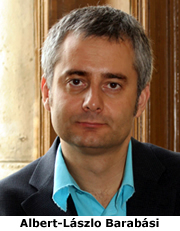
Your mother probably reminded you that you can pick your friends, but you cant pick your relatives.
No doubt she reminded you to be careful when picking your friends.
But even your mother probably never told you to be careful because your friends and relatives can make you fat.
That, in essence, is the message of a study that appeared in yesterdays (July 26) New England Journal of Medicine. An editorial by Albert-László Barabási, Emil T. Hofman Professor of Physics at the University of Notre Dame, accompanied the study and offered reflections on thenetwork scienceof obesity and the emergence of network medicine.
Networks, in this case those that pertain to social influence, may have just as strong an impact on the development of obesity as the otherwise strong genetic effect,Barabási wrote.
Researchers Nicholas Christakis from the Harvard Medical School in Boston and James Fowler of the University of California in San Diego found that obesity is contagious: contagious not in the sense of a virus or the flu spreading, butsocially contagious,in that it spreads from person to person in a social network.
Christakis and Fowler analyzed 32 years of obesity data on more than 12,000 people who participated in the Framingham Heart Study. They observed that when two people named each other as friends and one of them became obese, the second persons chance of also gaining a significant amount of weight increased by 171 percent.A persons chances of becoming obese increased 40 percent if a sibling became obese and 37 percent if a spouse became obese.
The researchers speculate that people have conversations and exchange ideas about what appropriate body image is and what healthy behaviors are and that this has a conscious or unconscious effect. They also found that the opposite is true: thinness can spread from one person to another.
In his commentary, Barabási noted thatnetwork science,a field of study he helped pioneer, is an emerging way of looking at not only sociology, but also cell behavior and disease transmission.
In the past seven years, our understanding of networks has undergone a revolution because of the new emergence of a new array of theoretical tools and techniques for mapping out real networks,he wrote in the Journal.
These advances have included some surprises indicating that most networks in technological, social and biological systems have common designs that are governed by simple and quantifiable organizing principles,Barabási said.The growing interest in interconnectedness has brought into focus an often ignored issue: networks pervade all aspects of human health.
The author ofLinked: The New Science of Networksand the founder of Notre Dames Center for Complex Network Research, Barabási believes that knowledge of the common patterns of networks can illuminate many of lifes basic mysteries. He believes that the application of network theory in biochemistry, through the emerging field of bioinfomatics, will have a profound effect on medical research.
In the past few years, we learned that network effects increasingly affect all aspects of biologic and medical research, from disease mechanisms to drug discovery,Barabási wrote in the New England Journal of Medicine.It is only a matter of time until these advances will start to affect medical practice as well, marking the emergence of a new field that may be aptly called network medicine.
_ Contact: Albert-László Barabási, Emil T. Hofman Professor of Physics, 574-631-5767,_ " barabasi.1@nd.edu ":mailto:barabasi.1@nd.edu
TopicID: 23847